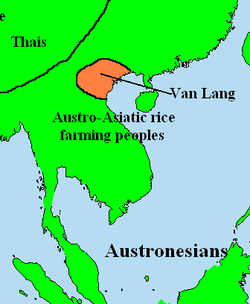Hồng Bàng Dynasty
| Hồng Bàng Period → Hồng Bàng Dynasty | ||||||||||
| Hồng Bàng | ||||||||||
| Confederacy, Kingdom and Tribe | ||||||||||
|
||||||||||
|
Map of Văn Lang in 500 BC.
|
||||||||||
| Capital |
Ngàn Hống (c. 2879 BC – ?) Nghĩa Lĩnh (29th c. BC) Phong Châu (until 258 BC) |
|||||||||
| Languages | Ancient Vietnamese | |||||||||
| Government | Tribe | |||||||||
| Tribal chief | ||||||||||
| • | 2879–2794 BC | Kinh Dương Vương (first) | ||||||||
| • | 408–258 BC | Hùng Duệ Vương (last) | ||||||||
| Historical era | Ancient history, Bronze Age, Iron Age | |||||||||
| • | Establishing of the Xích Quỷ confederacy by Kinh Dương Vương | 2879 BC | ||||||||
| • | Conquered by Thục Phán | 258 BC | ||||||||
|
||||||||||
The Hồng Bàng period (Vietnamese: thời kỳ Hồng Bàng), also called the Hồng Bàng dynasty, was a period in Vietnamese history spanning from the political union in 2879 BC of many tribes of the northern Red River Valley to the conquest by An Dương Vương in 258 BC.
It began with Kinh Dương Vương as the first Hùng king (Vietnamese: Hùng Vương), a title used in many modern discussions of the ancient Vietnamese rulers of this period. The Hùng king was the absolute monarch of the country (then known as Xích Quỷ and later Văn Lang) and, at least in theory, wielded complete control of the land and its resources.
The history of the Hồng Bàng epoch occurred in a series of eighteen Hùng king dynasties, divided by cultural periods. The Hùng king period was thriving along with the water-rice civilization in the Red River Delta, throughout most of the Bronze Age. Numerous wars were fought in the late stage of the period.
The history of the Hồng Bàng period is split according to the ruling dynasty of each Hùng king. The dating of events is still a subject of research. The conservative dates are not supported by any reliable absolute date for a span of about two and a half millennia. The following is the list including the Bronze Age cultures:
The Vietnamese name is the reading of Chinese characters "" assigned to this dynasty in early Vietnamese-written histories in Chinese. The meaning is a mythical giant bird.
Vietnam, a country situated along the eastern coast of mainland Southeast Asia, has had a long and turbulent history. The Vietnamese people represent a fusion of races, languages, and cultures, the elements of which are still being sorted out by ethnologists, linguists, and archaeologists. The Vietnamese language provides some clues to the cultural mixture of the Vietnamese people.
The area now known as Vietnam has been inhabited since Paleolithic times, with some archaeological sites in Thanh Hóa Province, reportedly dating back around half a million years ago. The prehistoric people had lived continuously in local caves since around 6000 BC, until more advanced material cultures developed. Some caves are known to have been the home of many generations of early humans. As northern Vietnam was a place with mountains, forests, and rivers, the number of tribes grew between 5000 and 3000 BC.
...
Wikipedia

